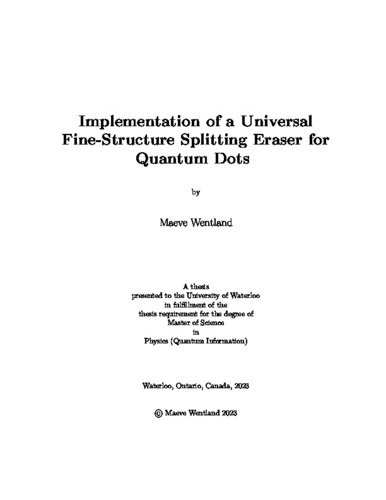| dc.description.abstract | Entangled photons are an important resource for different applications in quantum computation, quantum information, and quantum communication. Sources based on semiconductor quantum dots have successfully obtained on-demand, highly entangled photon pairs with a high repetition rate. However, the fidelity of the photon pair to a Bell state is reduced due to fine structure splitting (FSS) in the exciton state of the biexciton-exciton cascade. The FSS causes the exciton to precess during its lifetime resulting in a time-dependent entangled state which, when larger than the linewidth of a photon ($\approx$1 $\mu$eV), can reveal ‘which-path’ information for the exciton and biexciton cascade. A detector with a small timing jitter can resolve the dynamics of the entangled photon states. Real-world applications make it desirable to remove the FSS. Current techniques to remove the FSS include applying a strain, electric, or magnetic field. These techniques require post-processing of QD sources and are difficult to implement in conjunction with nanostructures such as nanowires or micropillar cavities. Here, we present an all-optical method of removing the FSS, which requires no post-processing of the source and works for any quantum dot sources. We propose frequency shifting single photons by emulating a fast-rotating half-waveplate using an electro-optical lithium niobate waveguide. In this thesis we show this method is capable of frequency shifting photons with high efficiency (88.4\%). We also examine how the efficiency is affected by the frequency that we are shifting by, and how the the set-up performs when operating over an extended period of time. We also examine several electro-optical devices to see if their behaviour is consistent and predictable.
In this thesis we also examine the building blocks for implementing a quantum circuit using entangled photons on a silicon nitride chip. These chips can be used instead of traditional free-space optics which take up a significant footprint, make it challenging to switch between experiments, and face losses because of coupling inefficiencies and attentuation. Silicon nitride is a low-loss waveguide material that, unlike the more traditional silicon, allows for the transmission of near-infrared photons. However, the newer material doesn't have significant libraries of pre-built components that can be used to create larger circuits. We examine the process of simulating, building, and integrating two of these components into a open-source library. This is the start of a process of integrating quantum dot entangled sources with building scalable quantum systems. | en |

